
Andy Kelly: The end of Metal Gear Solid
I was delighted when Metal Gear Solid V came to PC, and in such fine shape. Delight that soon shifted to dismay as the news broke that Kojima and Konami had parted ways, primarily because I knew that Kojima would be leaving without the series he created way back in the ‘80s. I’ve been playing Metal Gear games for most of my life, so they’re pretty special to me. Which is why it’s heartbreaking that there’ll never be another one directed by Kojima. His imprint on the games is so crucial to their unique feel that any made without him would just feel wrong.
And that’s what’s going to happen. MGS 5 sold very well indeed, and Konami still own the rights to it, so there will almost certainly be another game in the series—but without Kojima. Hey, it might be fine. I mean, BioShock 2 was made by a different team and I actually prefer that to the original in many ways. But I have a bad feeling about Metal Gear. Without Kojima acting as auteur, and imbuing the game with his own unique sensibilities, it may just feel like a hollow copy. A lifeless shop mannequin wearing a Big Boss eye patch. I might be surprised, but I doubt it.
And the Kojima fracas resulted in the death of another of my favourite series. I love Silent Hill, and the news that he was making a new one with Guillermo del Toro was hugely exciting. If anyone could have brought that series back from the brink, it was those guys. But I guess it wasn’t to be. Konami will probably make more Silent Hill games, but their recent attempts have been, let’s be honest, pretty stinky. They don’t seem to understand what made those early Team Silent games so unique, instead focusing on recycled scares and monsters. I can’t wait to see what Kojima does now that he’s gone solo and is making a game with Sony (which will be released on PC), but I’m sad we’ll never see another MGS with him at the helm ever again.
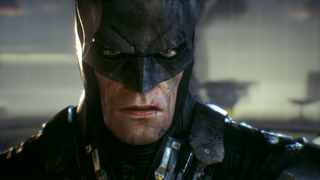
Chris Livingston: Arkham Knight launch
It's hard to think of a game launch more problematic—and downright bizarre—than Batman: Arkham Knight's on PC this year. The game was locked at 30 fps, not because it couldn't run at higher frame rates—it could—but to mask the fact that it was poorly optimized and would drop back down to or below 30 in certain sequences, even on high-end machines. Arkham Knight also had serious texture streaming issues, even on PCs that should have easily been able to handle the game, and the menu didn't even allow textures to be set to high, only low or medium. The game simply wasn't ready, and Warner Bros. suspended sales a day later.
It was a strange, unprecedented dilemma for us here at PC Gamer as well. We hadn't yet finished playing the game—we never got review code from WB, and these issues are certainly the reason why—when it was suddenly yanked off Steam and no longer for sale. We ultimately decided reviewing a game no one could buy was pointless—for those who had pre-purchased it or had bought it on launch day it was too late for a review to make any difference, and for those who hadn't yet purchased it there was no way to buy it anyway. So, we decided to wait to see if the game could be fixed, while continuing to cover the problems, the complaints, the progress, and anything else we could find related to the disastrous launch and the efforts to repair the damage.
On the bright side, Steam refunds finally made a long, long overdue arrival this year, allowing people to get their money back for defective products or games they simply didn't like. Warner Bros. offered refunds, as did GreenManGaming. Still, after a patch in September and the game becoming available for sale again in October, the problems continued, as many players still found optimization problems. Annoyingly, negative reviews on Steam dated prior to the re-launch were tagged 'pre-release review', marking another poor decision in a long series of series of them.
Batman: Arkham Knight's launch was a disaster for everyone. Loyal customers were sold a shoddy product and an enjoyable series was irreparably stained. The rush to meet deadlines and the release of games with known problems is nothing new, but judging from the months spent trying to patch Arkham Knight's issues, the game wasn't anywhere near ready when it was launched on PC. Here's hoping some lessons were learned, at least. The cost involved in cutting corners—the cost in refunds, lost sales, and especially in reputation—just isn't worth it.

Wes Fenlon: Nvidia burning consumer trust with GTX 970 memory buffer
I'm going to say this first: I still think the GTX 970 is the best graphics card in its class. If you're still mad at Nvidia about this issue, you'll probably be mad at me for having this opinion. That's fine. The GTX 970 sparked a huge controversy at the beginning of 2015, and that controversy overshadowed the fact that every review and benchmark of the GTX 970 showed it to be a fantastic performing card under circumstances that make sense for it (i.e. not 4K). But Nvidia fucked up by miscommunicating (or hiding, depending on how you looked at things) details about the GTX 970's architecture, which wrote to its last 500MB of memory at a far slower feed than the first 3.5GB. Nvidia apologized, but not in a way that really soothed fans who felt they'd been lied to.
That decision, coupled with the company's choice this fall to lock beta drivers away unless you have GeForce Experience and a registered account, alienated a chunk of the PC fanbase. It's disappointing, because Nvidia consistently makes great hardware, but some of its moves at least appear to put corporation before customer. The GTX 970 may have been blown out of proportion, but Nvidia deserved to be criticized, and I hope they do something in 2016 to win back some of the loyalty and trust they lost.
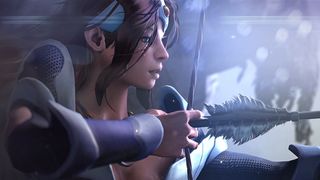
Chris Thursten: Dota 2’s difficult rebirth
I understand Dota 2 Reborn’s necessity. Game clients get out of date, and engines evolve: completely rebuilding the game only two years after launch was a laudable step by Valve, in many ways, laying the groundwork for what should be a long and happy future. As the League of Legends community continues to cry out for a similar update to their own game, it seems churlish to frown at Valve’s attempt to deliver.
The fact remains, however, that Dota 2 Reborn wasn’t ready to launch when it did. The optional beta gave way to a mandatory update far too early, stranding the entire player base in a new client that was buggy, incomplete, and often outright broken. For every well-used feature that was removed, there was something new we didn’t need: massive adverts for cosmetics. Later, regional chat channels.
Custom games and a new engine should have been a reason to celebrate. I’ve been playing this game since its first beta, and every other time Valve have rolled out a major update it has felt like Christmas. Dota 2 doesn’t get updates very often, but when it does, it matters. This was something else: a wholesale step backward that left me and most of my friends unwilling to play for the better part of a couple of weeks. There were huge connection problems in the UK. Several people struggled to run the game, when they’d be fine before. Our surging enthusiasm for the game, which had been a consistent factor in my life for three years, was momentarily halted. Dota 2 is all about momentum: as anybody who plays it knows, momentum can be hard to get back.
Things are better now, much better, but they’re not perfect. If Reborn makes it easier to update Dota 2, that hasn’t necessarily become apparent yet: 2015 is the slowest year for new heroes in the game’s history, with only two arrivals: Winter Wyvern in February and Arc Warden in December. Compare that to four in 2014, and ten in 2013. Balance updates are one thing—they can arrive whenever IceFrog wills. But events and new heroes are part of the lifeblood of the game and I hope this lull is a temporary thing (even though we’re now approaching the point where every old-DotA character has been ported across).
It’s strange to make my low of the year an update to a game I love, but I complain because I care. Valve claim that everything they do, they do for the community. In that sense, I hope they understand the ways the fell short of the mark with this one and do better next time.
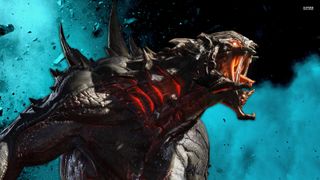
Phil Savage: Evolve, and awful pre-order DLC schemes
As I write this, 280 people are playing Evolve. Its peak, over the last month, has been 873 concurrent players. More people are playing Day of Defeat: Source—a ten-year-old shooter, and Valve's second most forgettable game. More people are playing the Steam version of EVGA's PrecisionX 16 tool. Evolve is, in every way that matters, a dead game.
I haven't played it, but critical opinion was mixed. Evan liked it; Chris really didn't. But beyond the question of whether or not it was good, I think part of its failure was due to its overwhelming launch options. Day-one DLC, companion apps, season passes—Turtle Rock and 2K seemingly used every possible trick to fill out its coffers. As individual DLC pieces, nothing seemed too offensive, but the sheer amount and ferocity of it sapped all enthusiasm I had to even try it. It's tempting, I'm sure, to imagine gamers are big, bottomless wallets for publishers to constantly dip into, but I'm glad that we're starting to see consumers push back.
And push back they have, not just in the case of Evolve and it's—count them—two goddamn season passes. Earlier in the year, Square Enix tried to boost pre-orders by promising to release the game four days early if a specific pre-order milestone was hit. As a scheme, it was dumb and insulting, and ultimately scrapped after a pretty vehement backlash. Good job, too: it would have seemed even more ridiculous after the game's release date was pushed back.
I don't think all DLC is bad, and the automatic negative response some people have seems to ignore the many benefits of letting teams continue development on their games. But if titles can't be profitable without alienating their customer base, we're going to be seeing a lot more Evolve-style failures.
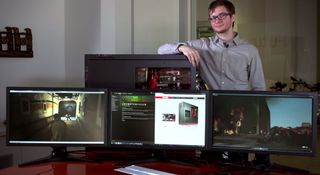
Tim Clark: Pouring one out for a fallen CS:GO soldier
Evan Lahti left us this year. I mean, don’t worry, he’s not dead. He’s just in Seattle now, WHICH IS THE SAME THING. Yep, this year we lost our US editor-in-chief and former PC Gamer lifer to the clutches of game development, of which no good ever comes, but I guess his heart wanted what it wanted. And what it wanted was not to listen to me ask questions about weapon balance, how MMR works, what happens if you get thermal paste on cashmere, and any one of a million other dumb questions I fired at him daily.
Evan was the guiding hand on PC Gamer’s American tiller when I arrived here, and in honesty not much changed thereafter. I most miss his unbelievable combination of calm and optimism, which never wavered even in the face external circumstances which fairly often strayed into batshit insane territory. Without him, we’d never have had the contacts, willpower and most of all vision to get the first PC Gamer Show at E3 done. As for his day to day work, his contribution here is sorely missed. For me, Evan’s writing was at his best when he was being an evangelist for the PC, like this piece on why you really should build your own, and when he was talking about the scene he loves so much, like this article about how $400 virtual knives saved CS:GO. Perhaps more than anything, I will remember the time I accidentally wrote something super inappropriate to him in the wrong chat window and he didn’t snitch on me to HR. Evan, you are a gent. May your AWP aim always be true.
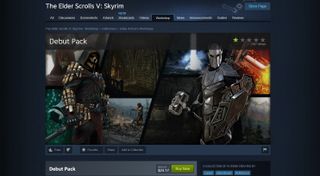
Tom Marks: Steam paid mods (and the reaction to it)
Steam’s paid mods program was handled embarrassingly poorly. No warning, no announcements, and no hope of ever being accepted. Instead of being introduced slowly and clearly, allowing people time to ask questions while providing transparent details, we got a whirlwind of anger and misinformation that tore through the modding community like a hurricane. And four days later, the storm had grown so violent that Valve reneged on the entire initiative.
The thing that really upset me about how the paid mods debacle went down is that I truly believe there is a way to implement a system like this correctly. There’s a world where modders can choose to profit from their work, players can support those creators, and the modding world does not come crashing down around us. But Valve’s decision to stage a hostile takeover of one of the most popular modding communities (Skyrim’s), giving only a select few modders notice that it was coming and not letting anybody else have a glimpse behind the curtain, was doomed from the start. Of course everyone reacted poorly to the announcement, as they should have. Similarly to when Valve decided out of the blue that they were trademarking “Dota”, they were trying to assert their control over a community they had little hand in building. In this case, it blew up in their faces.
I don’t think anybody has a problem with the concept of being able to financially support modders—they often pour a ridiculous amount of time and effort into something that they are legally prevented from profiting from. There was the occasional short-sighted perspective of “this thing I want is no longer free,” but I don’t think that was the crux of why people were mad. The community was scared that this meant the end of modding (which it wasn’t, modding can’t be killed by anything) and angry about suspect numbers for the sizeable cuts Valve and Bethesda would take. Personally, I think it would be great if there were an outlet for modders to sell their mods, but it would require a level of regulation, communication, and community involvement that Valve has proven time and time again they simply cannot provide. 10 months later and I’m still not sure of the actual percentage of a sale each party was getting, not sure if the “this is literally nothing” mods were being taken down, and not sure why Valve thought this would go any better than it did.
The way Steam’s paid mods program was presented was embarrassing, the way the community reacted was frustrating, and what we’re left with heading into 2016 is the status quo, for better or worse.

Samuel Roberts: Destiny still isn’t on PC
What’s that? Chris already took the Batman launch? Damn it. I actually thought this was a brilliant year for games compared to the grim horrors that saw out 2014, and predictably bad ports of console games aside, I thought the two main things that determine a year in gaming being good or bad (games released at the end of the year and E3 announcements) were the best they’ve been in a long time. It’s a year that brought us Pillars, Fallout 4 and The Witcher 3—and that’s just one genre.
There’s just a single missing piece, then. Truthfully, I spent a lot of this year playing Destiny on PS4, along with some of the other members of PCG. It’s the only console game I’ve played at all this year, actually, and it’s fitting that this is one inspired almost solely by games that began life on PC. So why is it still console-only? Is it because the shooting is built exclusively for the comparative lack of precision offered by a controller next to a mouse and keyboard? I don’t buy it. Everything else I wanted to play on consoles made it to PC (Bloodborne aside), so why are you holding out on us, Bungie?
It’s particularly disappointing this year, when The Taken King expansion made the game reach its full potential by stripping back the terrible story, adding valuable new content and, most importantly, doubling down on Nathan Fillion, always a proven formula for success. I’d be more than happy to take my character and switch to PC, and I’m almost certain Destiny would catch fire if it found its way onto Steam next year.
What is it with Bungie games and PC? We just never seem able to get the best out of them. The Halo: Master Chief Collection’s absence remains another source of disappointment. If and when Destiny does finally make it to PC, there’s plenty of things other MMOs can learn from it.
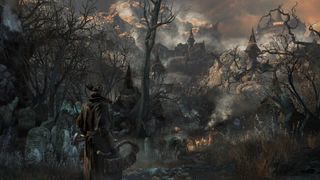
Tom Senior: Bloodborne is but a dream on PC
This year’s best horror game didn’t come out on PC. Bloodborne is a festering masterpiece from the creators of Dark Souls, bankrolled by Sony as a Playstation 4 exclusive. As such, it’s likely we’ll only see it on PC in emulated form years from now.
It’s a real shame, because the blood-slick streets of Yarhnam would look incredible on a good machine. The few niggles I have—a slightly uneven framerate, aggressive motion blur—could be evened out with a fat graphics card, and that detailed world deserves all the processing power you can throw at it. I don’t demand 60FPS from games, but Bloodborne’s sharp combat would feel even better at a smoother clip.
To my tastes, it’s a better combat game than Dark Souls, and while it looks as though Dark Souls 3 will incorporate Bloodborne’s quicker pace I’m afraid it will only leave me eager to don a hunter’s coat once more. Miyazaki has talked about moving away from the Souls/Bloodborne template after Dark Souls 3. If so, along with Demon’s Souls, we’ll be missing a considerable chunk of the Souls lineage on PC. Maybe I’ll emulate the King’s Field series next year instead.

James Davenport: Life, love, games, loss
Lows are difficult for me. Most folks that know me know I tend to laugh at nearly everything, especially the absurd and bleak. It’s a nice way to cope with difficult circumstances. Lows are super difficult this year because my dog passed recently (but at least our relationship was immortalized in GIF form). I've never known a deeper sorrow, so every video game blunder feels trivial in comparison. Arkham Knight port was botched? Life can blink out instantly. Bloodborne isn't on PC? We’re talking bags of bone and blood. MGS 5's story was bad? Someday, everything you love will disappear. Video games may be my job now, but they've never been less important to my fundamental well-being.
I mean, I went from disaffected twenty-something bouncing between jobs while my existential dread grew at a steady rate to a writer at PC Gamer, the magazine I used to ogle in supermarket lines as a kid, the podcast I’d play before bed almost every night as a teen, and now, the place I chill everyday and get yelled at about Blizzard games (watch out for that Tim Clark and Tom Marks crosstalk). You’d think I practically worship games to leave my beautiful home and everyone I know to live in one of the most expensive cities on earth for them.
But loss tends to throw priorities into sharp relief. With the loss of Penny, I’ve been forced to revisit what’s valuable to me. Games drop to one of the lowest rungs on the ladder unless they exist in context in which they can be shared. Whether that’s in a conversation with a friend, a competition with several, as a tool for empathy or learning, or in shared silence with my pup’s head in my lap over a relaxing session of Proteus. She liked the sound the rabbits made.
XCOM 2 was delayed. Dang it! I have to read a bunch in Pillars of Eternity? Heck no! Rainbow Six has microtransactions? Call the money police! All bummers, for sure. I am more bummed that an mid-tier burger costs $12 in San Francisco. Five OK burgers equals one Rainbow Six. Damn. I don’t know. I miss my pooch. Hug your dog, cat, parents, significant other or human-shaped pillow, and if they’re willing, play a game together. If they’re not into it, go on a walk, play some fetch, take that fishing trip your dad’s been bugging you about for years. Use my general, vague low to reassess where games are in your life, not that they’re trivial. Let games be scaffolding, a component in your life that bolsters the good things.
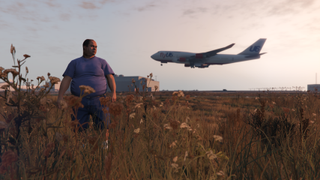
Tyler Wilde: I didn’t have fun with a video game
I turned 30 this year. My hair is falling out. My mom said that I've "filled out.” I didn't like Fallout 4. It was a hard year, eh? I've really been trying, though. I put this foam stuff on my head for like two months, and nothing happened. I guess you're supposed to do it for longer, but I can't be bothered. And I played Fallout 4 for 14 hours—about how long I spent at the gym—and it didn't do anything for me either. Maybe if I stuck with things, life would be sweeter and hairier and skinnier, but I’d also have less time to fume over internet comments and watch Rocket League highlights. And isn’t that what 2015 was all about?

PC Gamer is the global authority on PC games—starting in 1993 with the magazine, and then in 2010 with this website you're currently reading. We have writers across the US, Canada, UK and Australia, who you can read about here.
Most Popular

